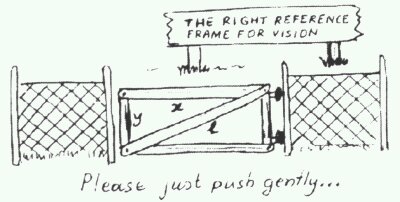Dear
Everybody,
I read recently a very fascinating story in
G Wyszecki and W S Stiles book on Colour Science, which was attributed to
Redhead, who had attributed it to H R Post: Once upon a time there was a farmer
who often had to construct gates for his fields. Over the years he noticed,
that to construct the gate he needed two pieces of wood of length x, for the
horizontal beams of the gate, two pieces of wood of length y, for the vertical
beams of the gate, and one piece of wood of length l to put across the
diagonal. He was a clever farmer and he noticed that the larger x and y were,
the larger l should be. However, he did not know Maths and he had never heard
of Pythagoras. Over the years, he worked out that 1 should be a little shorter
than x+ y and in fact he defined an (unknown) function f(x + y) to express their relationship.
During the long winter nights when work in the farm was not possible, he amused
himself by working out, using his experience, plots of f(x + y) versus x, plots of f(x + y) versus x + y and so on. All very
complicated, but carefully done to help him and his descendants be able to work
out from the graphs what size pieces of wood they would need in order to
construct a gate of a certain size.
This story is fascinating because it echos a
lot of what often goes on in Science: Ptolemy developed an elaborate theory on
epicycles to explain the movement of the planets around the Sun, based on the
premise that the Earth was at the centre of the planetary system. If he could
only had paid attention to Aristarchus who 360 years earlier had argued that
the Sun must be at the centre of the planets, things would have been so much
easier! It took another 1400 years before Copernicus came along to re-discover
Aristarchus theory and make redundant the elaborate epicycles of Ptolemy. The
story repeated itself with Maxwell's equations and Lorentz transforms. It took
Einstein to put the whole issue right, by making a simple conjecture: The mass
of an object changes when it moves.
I was recently in a workshop in Belize and
there I heard Rama Chellapa saying the unforgetable: "In Computer Vision,
we do not solve the problems; we just get tired of them!" Is it because
our Copernicus has not come along yet? Or is it even worse, our Aristarchus has
not been born yet? How far do we have to go before something clicks and all
falls into place? Perhaps the farmer's son will do Pythagoras at school, go
home tell his father and all will be straightforward from there and on! And
perhaps the farmer will find something else to fill up his long winter nights,
hopefully another mathematical game!
Maria
Petrou
PS: I come to think now, that as the editor
of IAPR I really ought to say that the farmer himself should actually attend
the 13th ICPR in Vienna where ALL issues of Pattern Recognition will finally be
sorted out!
